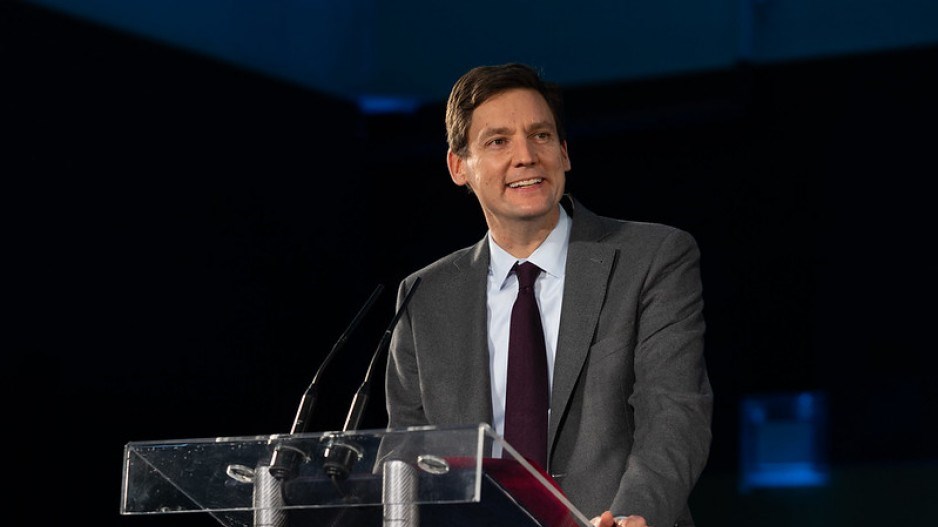For most new premiers, their swearing-in day is a leisurely victory lap. Typically, they pose for the cameras, introduce their new cabinet and pat themselves on the back for winning an election or leadership race.
But David Eby seemed determined to do things differently Friday – both by becoming the first premier to take the oath of office at a First Nations-hosted event, but also by taking the rare step of turning the event into a backdrop for major policy announcements.
Eby jumped to warp speed just minutes after swearing allegiance to the King, unveiling two new affordability promises while still standing on stage in front of the Lt.-Gov. Janet Austin.
The first, a $100 credit on residential BC Hydro bills in December, is a rehash of something John Horgan first announced three months ago, but this time with a dollar figure attached. It will cover one month of an electricity bill for an average British Columbian.
“It's not going to solve everybody's problems but it will make a difference for a lot of families around B.C.,” said Eby.
The second, a new affordability credit, also builds on the kind of cost-of-living credits Horgan announced in September, but this time with an extra up to $164 per person, or $410 per family.
The key phrase here is “up to” because the credit is income-tested, and if you have a personal income of more than $36,901 a year, or a household income greater than $43,051 a year, you’ll be getting less than that maximum amount.
If these new credits work like the old ones, they’ll benefit few people overall – only 26 per cent of families got the maximum child benefit under Horgan’s September plan – but the people that should get the money are the most needy low-income individuals.
Neither measure is particularly impressive on its own.
But Eby, determined to live up to his moniker of a “man of action” who will “hit the ground running,” has laid out a four-day cavalcade of announcements that altogether is the political equivalent of being shot out of a cannon to kickstart his premiership.
On Sunday, he said he’ll tackle public safety issues, including the tent encampment problem in Vancouver, and more generally the crime, prolific offenders and random assault concerns expressed by British Columbians in urban cities across the province.
Speculation has been swirling for weeks that the province, despite insisting it was not possible, has found a way to issue a directive to Crown prosecutors to crack down on prolific offenders.
The crime package may dovetail with Eby’s stated plan to “take over” the Downtown Eastside and put under provincial coordination the many services available there, to maximize their impact on the most vulnerable.
“I see our response to the Downtown Eastside as being the provincial government taking a leadership role in the short term to address the encampments on Hastings Street, to support the people who are living in tents on the sidewalk right now, to get them into decent housing, to get them the supports they need,” said Eby.
“And in the medium and long term, to address the issues of the residential hotels that are aging and falling apart, that are not adequate housing.”
On Monday, the fledgling Eby administration will switch to housing, with two bills expected in the legislature that he promised will immediately create thousands of units of rental housing.
“It's a remarkable thing that by passing law we can open up new rental housing for people,” he said. “We're going to do that.”
That could be something like his promise to make secondary suites legal across B.C., regardless of whether municipalities approve them, or to eliminate no-rental rules put in place by strata corporations in condos and apartment buildings. Both could have a big immediate impact on the rental market.
The accelerated pace that Eby is launching is the clearest sign yet of the immense pressure he is under to change the NDP government’s course on major files.
Numerous polls have shown voters are upset about the province’s direction on health care, crime, homelessness and cost of living. The NDP has drifted for months on these issues, as Horgan slowly transitioned out of office. Now it’s all on Eby to pick up the pace, and show results.
“I make absolutely no apologies for being in a hurry to deliver for B.C.-ers on the priorities that they care about,” he said.
“I feel the urgency of families that are struggling with the cost of living, that can't find housing, that need health care, that are worried about public safety, and they are going to see quick movement from me.… I've got two years with my team to deliver for B.C.ers, to show them that we're fighting for them, that we're moving forward on their priorities, and I wasn't going to waste a moment, including my swearing-in speech, to announce how we're going to do that.”
Eby's off to a good start, saying the right things and moving at the right pace. But we’ll have to see how it all comes together in the next few days.
Rob Shaw has spent more than 14 years covering B.C. politics, now reporting for CHEK News and writing for Glacier Media. He is the co-author of the national bestselling book A Matter of Confidence, and a regular guest on CBC Radio.



